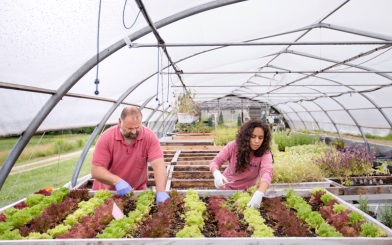Unity College was recently recognized by the National Association of College and University Food Services for its commitment to sustainability! That’s good news, not only for the college but for other educational institutions throughout Maine.

Unity College Dining used more than 3,600 lbs of produce from McKay Farm and Research Center during the academic year — not counting the un-saleable produce gleaned from McKay and converted into products such as “McKay-chup,” hot sauce, herbed salt, and herbed butter. Here, Mckay Farm and Research Station manager Chris Bond (left) and summer intern Stephanie Martinez-Alfonso, Unity ‘19, harvest lettuce for sale at the farm store on a cloudy summer day. Photo courtesy of Unity College.
Unity’s efforts include initiatives that look at every level of the Food Recovery Hierarchy as a tool in the toolbox with the goal of making sure little, if any, organic material from the food cycle ends up in a landfill, where it generates methane, a climate changing gas several times more powerful than even CO2. This includes sourcing food locally when possible. Locally sourced produce tends to be more palatable because it is fresher and can be harvested at, or closer to, peak ripeness and flavor. It also includes efforts to ensure the dining services program is ordering and preparing the right amount of food for the needs of the college population.
Inevitably, with food, there is some “waste.” Ideally, no edible food would go any lower on the hierarchy than use in livestock feeding. But what about potato peels, egg shells, and the like? Unity is partnering with Agri-Cycle Energy to turn those scraps into compostable material and energy.
These are all good things helping to propel Unity College to the head of the pack. Considering the size and resources of some of the members of that pack (colleges and universities around the nation including Duke University and the University of Texas at Austin) this is quite an accomplishment! It also helps establish models at the college level that can help inspire and guide efforts in schools serving younger students.
You’ve probably seen, or heard about, NRCM’s work to help reduce food waste in Maine’s public schools. If you haven’t, and would like to learn more about what NRCM can do to help your local school reduce its food waste, save money, expand curriculum to offer hands-on learning opportunities, and help address immediate food insecurity issues, contact NRCM at nrcm@nrcm.org. With Maine’s public K-12 schools possibly producing more than 7 million pounds of food scraps and wasted food, our state’s institutions of higher education can play a critical role in leading the way toward a much more sustainable paradigm. Unity College is setting a great example!
If you work or volunteer in your local schools system, you’ve probably seen first hand the prodigious waste produced through breakfast, lunch, and snack programs. What you may not know is that the challenges to alleviating this waste can be, well…challenging. Lack of staff time, inadequate funding, lack of flexibility in curricula, lack of support from administrators, administrators who want to tackle the problem but don’t have staff that can help—these are all roadblocks for local schools. Many schools are not aware of solutions. Add inertia and habit into the mix and the task of reducing food waste, and the associated costs it creates, can seem overwhelming in a school setting. While a college like Unity may operate under different constraints than a public school in the K-12 system, the hurdles to reducing food waste are no less daunting and are likely similar in nature. Unity College is working to overcome those hurdles and help establish the appropriate use of food as the institution’s baseline ethic.
Congratulations to Unity, the students, and staff!











Leave a Reply